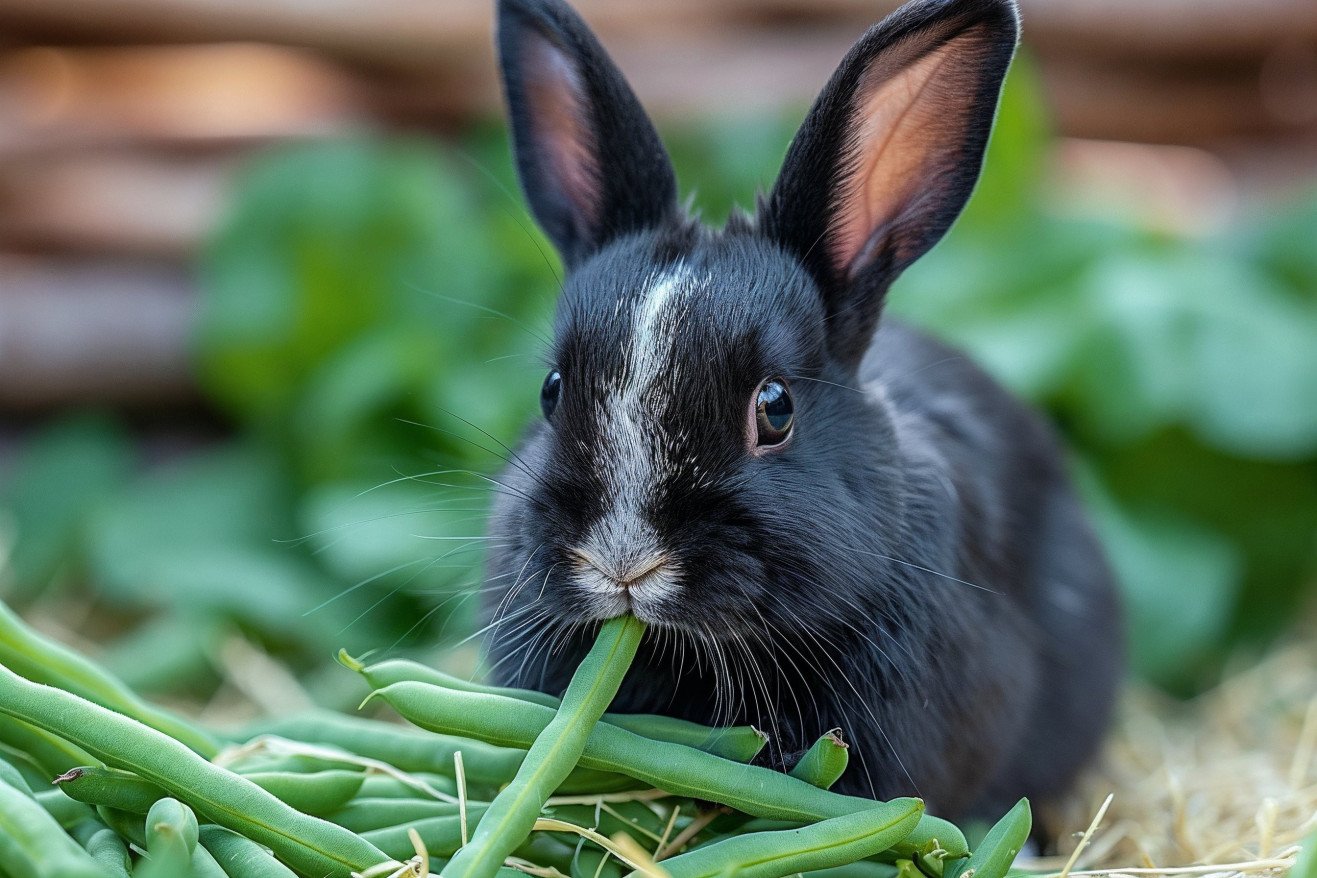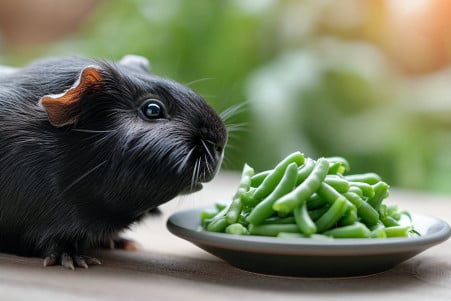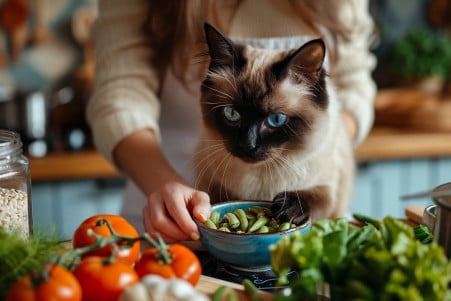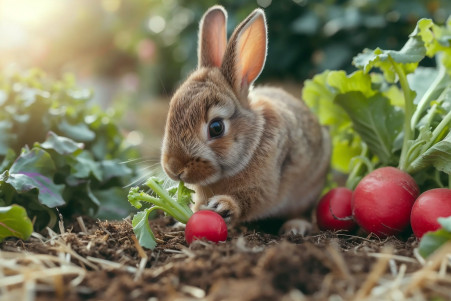Can Rabbits Have Green Beans? A Guide to Healthy Rabbit Treats
8 February 2024 • Updated 8 February 2024

You may eat green beans all the time, but can you share them with your pet rabbit? Yes, rabbits can have green beans as a treat, but it’s important to do so in moderation. Make sure to introduce them slowly and in small quantities to avoid any tummy troubles. Make sure to give them fresh, organic, and uncooked green beans that have been washed well to avoid pesticides and keep your rabbit safe.
In the sections below, we’ll take a deep dive into the rabbit’s dietary needs and digestive system, drawing on information from veterinarians and animal nutrition experts. We’ll also look at studies that have investigated the nutritional content and potential downsides of giving green beans to rabbits. This information will help you find the right balance so that you can give your pet rabbit the benefits of green beans while keeping them healthy and happy.
Can rabbits have green beans?
The Fiber-Based Rabbit Diet
The rabbit’s unique digestive system means that their diet should be high in fiber. In the wild, rabbits eat a diet that is made up mostly of grasses, which are high in fiber and essential to their digestive health.
As Supreme Petfoods explains, rabbits are hind-gut fermenters, and their cecum, a part of their large intestine, is responsible for fermenting fibrous material and creating cecotropes that rabbits will then eat to get the most nutrients out of their food.
This means that the rabbit’s diet should be based on hay and grass, which should make up 80% of their daily food intake.
Not only does this help to keep their teeth healthy by providing them with something to chew on, but it also helps to keep their digestive system moving and prevent stasis, a potentially fatal condition.
Even so, experts like Dr. Stephen Duren, who was quoted by Standlee Premium Western Forage, explain that while pelleted diets can be used to help supplement a rabbit’s fiber intake, they need to be high-quality and supplemented with plenty of forage to keep the rabbit’s digestive system working properly.
Feeding rabbits the wrong foods can lead to a number of health problems, including obesity, dental disease, and digestive issues. As a result, the “golden rule” of feeding non-staple foods like green beans is to do so in moderation and to introduce them slowly. By introducing these foods gradually, you can help the rabbit’s digestive system adjust to them without throwing off the balance of their hay-based diet.
Green Beans: Nutritional Information for Rabbits
While green beans are a relatively unassuming food in the human diet, they can be good for your rabbit in the right circumstances because they are so nutritious. According to Healthline, a cup of cooked green beans has 4.0 grams of fiber, which is important for a rabbit’s digestive system.
They also have about 2 grams of protein per cup and are low in sodium. In addition, the low FODMAP content of green beans (which means they are low in fermentable carbohydrates) makes them less likely to cause digestive upset and gas, which is a common problem in rabbits.
Green beans are also a good source of other important nutrients including folate, vitamins C, A, K, and a variety of B vitamins, all of which are important for a rabbit’s well-being. In addition, green beans have manganese, calcium, iron, magnesium, phosphorus, potassium, and zinc, all of which are important for a variety of physiological processes, according to Our Lovely Rabbits.
That said, it’s important to make sure your rabbit only eats green beans in moderation. Eating too many green beans can lead to kidney damage because of their high calcium content and can also lead to digestive upset, according to The Bunny Hub.
To make sure your rabbit can enjoy the benefits of green beans without the risks, make sure to only give them to your rabbit as an occasional treat instead of a regular part of their diet.
Rabbit Care: How to Feed Green Beans to Your Rabbit
If you want to feed your rabbit green beans, you should do so in a way that is safe and healthy. To do this, you should feed your rabbit green beans in moderation.
According to Pawmaw, vets recommend that rabbits eat green beans in amounts that make up no more than 5% of their daily food intake, which is about one tablespoon per 4 pounds of body weight.
It’s also important to introduce green beans slowly. Give your rabbit a small amount and then wait to see if they have a normal bowel movement within 24 hours. If they have soft stool, stop feeding them green beans and try another vegetable.
It’s also important to monitor your rabbit after you’ve introduced green beans into their diet. A-Z Animals notes that you should watch for signs of gas, bloating, or diarrhea, as these could be signs that your rabbit is having trouble digesting green beans.
Fuzzy-Rabbit also recommends mixing green beans in with other rabbit-safe vegetables to ensure that your rabbit gets a well-rounded diet. Good options include dark leafy greens like kale, basil, and carrot tops, all of which can be mixed in with green beans to ensure that your rabbit gets a variety of nutrients.
By following these guidelines, you can ensure that green beans are a healthy addition to your rabbit’s diet, rather than a problematic one.
The Fine Line: Green Beans and Rabbit Health
While green beans can be a healthy addition to your rabbit’s diet, there are some health concerns that need to be managed. For example, overeating green beans can lead to digestive issues like gas and diarrhea, which can be especially dangerous for rabbits due to their delicate digestive systems.
As a result, Rabbit Care Tips suggests feeding these vegetables sparingly to avoid these issues and making sure to only feed them in small amounts as part of a well-rounded diet.
Another potential issue to consider is pesticide exposure. Fuzzy-Rabbit, with insight from Dr. Kathryn Rosalie Dench, explains that it’s important to wash green beans thoroughly or buy organic to avoid pesticide exposure. This is because non-organic green beans can have pesticide residues that could be toxic to your rabbit.
In addition, green beans have oxalates, which can lead to calcium deficiency or kidney stones if consumed in large amounts. While this isn’t a major concern when green beans are fed in moderation, it’s important to make sure that you’re feeding your rabbit a variety of vegetables and keeping an eye on their overall calcium intake.
If your rabbit does experience any discomfort or illness after eating green beans, it’s important to monitor them closely. If you notice symptoms like lethargy, diarrhea, or changes in eating or pooping habits, it’s important to contact a vet. Rabbit Care Tips suggests that you should feed your rabbit a diet of hay and easily digestible vegetables until they recover.
Of course, good rabbit care goes beyond just their diet; a healthy rabbit also needs a living environment that supports their well-being in other ways like exercise and mental stimulation.
Taking Care of Your Rabbit’s Health Outside of Their Diet
Of course, a healthy diet is just one part of taking care of your rabbit. While healthy foods like green beans can help, a rabbit’s health is also impacted by exercise and mental stimulation. As the Best Friends Animal Society points out, rabbits are active and inquisitive animals that need to be able to run, jump, and explore to stay healthy and happy.
In addition, it’s important to make sure your rabbit is getting enough to drink. The RSPCA notes that it’s important to make sure your rabbit always has access to fresh water. Not only is water important for your rabbit’s health, but it also helps them digest their food, especially when they’re eating a diet that’s high in fiber from hay and vegetables.
You also want to make sure that you’re feeding your rabbit a variety of foods to make sure that they’re getting all the nutrients they need and to make sure that they don’t get bored. As explained in Rabbit Diet 101 by Bunny Lady, feeding your rabbit a variety of leafy greens and vegetables in addition to their hay will help ensure that they’re getting the nutrients they need and will help them stay healthy.
By making sure that you’re providing a supportive environment, you can help your rabbit exhibit natural behaviors and improve their quality of life. Making sure that your rabbit has enough room to exercise, providing toys that will keep them mentally stimulated, and making sure that they have plenty of social interaction can all help ensure that your rabbit is happy and healthy.
Conclusion: Green Beans Are a Healthy Addition to a Rabbit’s Diet
In summary, green beans can be a healthy part of your rabbit’s diet as long as they are given in moderation.
As Pawmaw pointed out, green beans are full of nutrients that can help your rabbit stay healthy, but they can also lead to problems like digestive issues and kidney damage if they are overfed. Make sure to introduce green beans slowly and keep an eye on your rabbit’s reaction to make sure they are maintaining their digestive health.
It’s also important to remember the need for a varied diet, as mentioned by Best Friends Animal Society and the RSPCA, that includes a base of hay and a mix of leafy greens. While green beans can be a fun treat, they should never replace the essentials that are necessary for a rabbit’s well-being.
Ultimately, it’s up to rabbit owners to stay attuned to their pets’ dietary and health needs. By making sure that you are feeding your rabbit mindfully and keeping an eye on their welfare, you can make sure that they are able to live a long and healthy life. And when you see your rabbit enjoying a crunchy green bean, let it be a reminder of the bond that you and your rabbit share.


